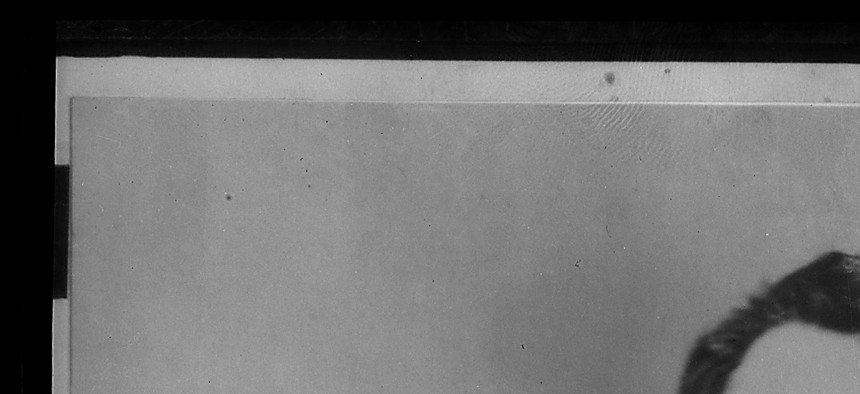
Portrait National Archives
When Lincoln's State of the Union Leaked
Someone close to Lincoln gave excerpts to the press, and the new president scrambled to avoid a very public humiliation.
In this age of political posturing, the White House tries to scoop itself on the State of the Union message by pre-publicizing it in dribs and drabs. But in Lincoln’s day, leaking this affair of state was treated as a scandal—one that might have meant a world of hurt for Honest Abe just as his 11-year-old son died and the Civil War started to turn the Union's way.
Hours before Lincoln sent his first State of the Union message to Congress on December 3, 1861—in those days, the message was delivered in writing—an anti-Lincoln newspaper, the New York Herald, published a few excerpts. No big deal, right? Wrong. Lincoln scrambled to cover up the apparent source of the leak—his wife—and to save his administration from a public humiliation.
The House Judiciary Committee pursued the leaker, or leakers, with a vengeance. It already had reason to suspect their identities before its investigation began in February 1862. The correspondent for the Herald’s archrival New York Tribune had fingered, as a go-between, a flatterer and social climber named Henry Wikoff, who was getting “news from the White House … from women … members of the president’s family.”
The Chevalier Wikoff, as he liked to be known, for some obscure past service to the Spanish crown, had hobnobbed with royalty all over Europe. Now in Washington, he served as a secret correspondent for the Herald (he was friends with the newspaper’s founder and editor, James Gordon Bennett) and had exploited Mary Lincoln’s social insecurities to insinuate himself into her affections.
The involvement of Mrs. Lincoln may help explain the vigor of the committee’s pursuit. John Hickman, the severe-looking chairman, was an eloquently anti-slavery Republican from Pennsylvania who presumably shared many northerners’ scorn for the president’s wife. Besides having a brother, three half-brothers, and three brothers-in-law in the Confederate army, Mrs. Lincoln was assailed for lavishly redecorating the Executive Mansion while Union soldiers needed blankets. Earlier in February, the press had pilloried the First Lady (to whom that term was first applied, by the correspondent for The Times of London) for putting on an “ostentatious” and “most unseemly” White House ball.
Chairman
Hickman also had reason to attack theNew York Herald, which had knocked him in 1860 as “only a fighter with his tongue.” The committee subpoenaed Wikoff, who confessed his own role in informing the Herald of the main points of the president’s address. But he refused to reveal how he had learned of them. For this, he was held in contempt of Congress and jailed.
Wikoff was confined in a rat- and roach-infested storeroom in the Capitol’s subbasement, attended by a Newfoundland named Jack. For a dandy who showed (a biographer wrote) a “slightly hysterical reaction to any situation,” one night was enough.
He had help in getting out. Daniel Sickles, another of the capital’s peacocks, went to the White House on his behalf. As a congressman, Sickles had shot and killed his wife’s lover on a Washington street (and won acquittal on the unprecedented grounds of temporary insanity). Now a brigadier general known for his political skills, he visited Wikoff’s unfortunate quarters the next morning, passing himself off as the prisoner’s counsel.
Their conversation prompted Wikoff to send a note to Chairman Hickman that he was ready to talk. The sergeant-at-arms brought the witness back before the committee, where he dumbfounded the members when he named his source for the leak: none other than the White House gardener, John Watt. Watt confessed the following day, telling the committee the unlikely story that he had seen the message in the president’s library, memorized passages, and recited them to Wikoff.
But why would the gardener admit guilt for something he hadn’t done? Well, he was in a legal tangle of his own. The month before, another House committee had accused him of secessionist sympathies. Worse, he was engaged in blackmail. As an expert at padding invoices, he had taught the skill to Mrs. Lincoln, whose social and decorative ambitions exceeded Congress’s purse. Now he was demanding $20,000 in exchange for three of Mrs. Lincoln’s incriminating letters. Accepting blame for leaking the president’s message, Watt lost his White House job but landed a $1,500 per year sinecure at the Patent Office.
If doubts remained about the source of the leak, the Herald’s regular Washington correspondent seemed to settle them a few days later. S.P. Hanscom had wired the original dispatch to New York after Wikoff told him of the annual message’s contents. Testifying under protest, he told the committee Wikoff had assured him “that he got it from Mrs. Lincoln; otherwise I should not have sent it … I readily believed what he told me, because I knew that he was frequently up at the White House.”
The committee heard from another witness as well: President Lincoln. He reportedly testified in person, and in secret, that nobody outside his Cabinet had seen the message in advance—meaning, not his wife.
The next week, the Judiciary Committee members voted not to publish testimony about the role of “any member of the President’s family.” With only a single dissent—the chairman’s—the committee spared the first family any further disgrace. Despite the dangers they posed, the leaked excerpts proved no more memorable than the rest of the speech. Lincoln's first State of the Union message sank into the historical obscurity that is such addresses' customary fate.
NEXT STORY: Why You Should Take Time to Not Think






